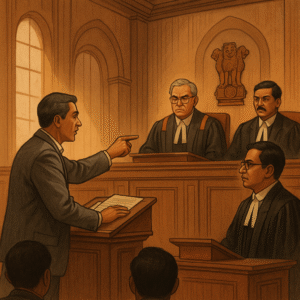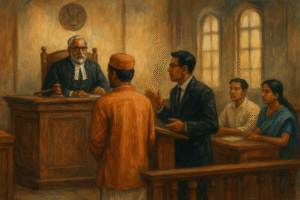Simplified Explanation of the Judgment
In a recent decision, the Patna High Court upheld a two-year ban on business dealings imposed by a public sector company (NTPC) against a contractor involved in civil maintenance work at the Muzaffarpur Thermal Power Station. The petitioner challenged this ban on the grounds that the Central Bureau of Investigation (CBI) had filed a closure report in the associated criminal case, finding no evidence of criminal wrongdoing.
The court observed that the contractor had been awarded multiple work orders between 2012 and 2015 for maintenance jobs valued at over ₹2.8 crores. During a surprise check by NTPC’s vigilance team, several irregularities were discovered. These included manipulated gate passes, invoices for construction materials that allegedly never entered the premises, and falsified entries in the contractor’s own documents.
Based on this, a show-cause notice was issued in 2019. An FIR followed, and the CBI launched an investigation. Although the CBI later filed a closure report (accepted by the special court), citing insufficient evidence to proceed criminally, NTPC went ahead with administrative proceedings.
The High Court clarified that the closure of a criminal case does not bar an employer or authority from taking action on the administrative side. Unlike criminal proceedings, where proof beyond reasonable doubt is needed, administrative actions can be based on the preponderance of probabilities.
The petitioner argued that the grounds for blacklisting mentioned in the final order did not align with those in the initial show-cause notice. However, the court noted that the same allegations were reflected, and the petitioner was provided with an opportunity for an oral hearing. The court found no procedural flaw in the decision-making process.
Hence, the Patna High Court refused to interfere with NTPC’s decision, affirming that judicial review under Article 226 does not permit re-evaluation of factual findings unless there is a clear breach of natural justice or arbitrariness, which was not the case here.
Significance or Implication of the Judgment
This judgment reinforces the distinction between criminal liability and administrative accountability. It sends a clear message to contractors and service providers dealing with public sector units that administrative action, such as blacklisting, can proceed independently of criminal outcomes.
For government agencies and PSUs, the verdict provides legal backing to take precautionary or disciplinary measures based on internal vigilance findings, even in the absence of a criminal conviction. For private entities, it emphasizes the importance of procedural fairness and maintaining compliance with contractual and ethical standards.
Legal Issue(s) Decided and the Court’s Decision
- Can administrative blacklisting be upheld despite a criminal case closure?
✅ Yes. The court held that administrative proceedings require a lower standard of proof compared to criminal cases. - Was the blacklisting order procedurally valid?
✅ Yes. The court found that due process was followed, including a proper show-cause notice and opportunity for hearing. - Can a writ court interfere with blacklisting orders?
✅ Only in cases of procedural irregularity or arbitrariness. The court found none in this case and declined to interfere.
Case Title
Bhupendra Singh v. Ministry of Power & Ors.
Case Number
Civil Writ Jurisdiction Case No. 344 of 2024
Coram and Names of Judges
Hon’ble The Chief Justice K. Vinod Chandran
Hon’ble Mr. Justice Harish Kumar
Names of Advocates and who they appeared for
- Mr. Sanjeev Kumar Jha — for the petitioner
- Ms. Poonam Kumari Singh — for the Union of India
- Mr. Tuhin Shankar — for NTPC
- Mr. Arun Kumar — for Respondent No. 13 (Utility Powertech Ltd.)
Link to Judgment
https://www.patnahighcourt.gov.in/ShowPdf/web/viewer.html?file=../../TEMP/e87487bd-a232-4742-b6b1-45421eddb688.pdf&search=Blacklisting
If you found this explanation helpful and wish to stay informed about how legal developments may affect your rights in Bihar, you may consider following Samvida Law Associates for more updates.







